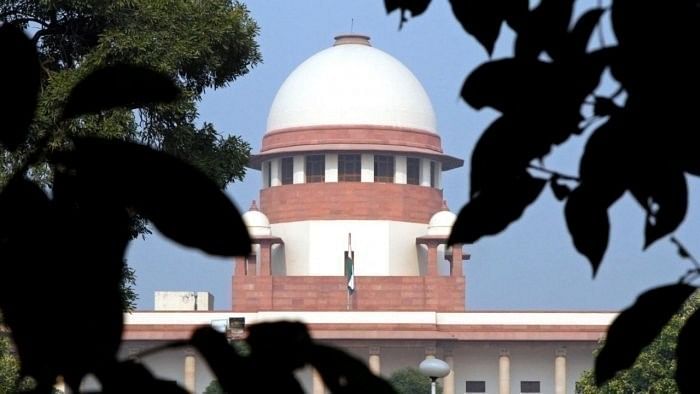
The Supreme Court of India.
Credit: PTI File Photo
New Delhi: The Supreme Court on Friday framed comprehensive guidelines for the effective and useful implementation of the Prevention of Child Marriages Act in the country, saying the social legislation will only succeed through the collective efforts of all stakeholders to address the issue within a broader social framework which emphasises the need for multi-sectoral coordination.
A bench led by Chief Justice of India D Y Chandrachud held that child marriage, and even the betrothal of a child for marriage, robs a child of her free will to choose a life partner.
The court stressed the right to childhood belongs to all sexes. Education- primary, sexual and life enhancing – is integral to the right to childhood. Realisation of this right is crucial in dealing with the evils of child marriage.
It said that the Parliament may consider outlawing child betrothals which may be used to evade penalty under the PCMA. While a betrothed child may be protected as a child in need of care and protection under the Juvenile Justice Act, the practice also requires targeted remedies for its elimination, the court said.
Noting the child marriages in the country affected the constitutional guarantees of the right to education, health, autonomy and others, a bench of Chief Justice of India D Y Chandrachud and Justices J B Pardiwala and Manoj Misra said specific guidelines were intended for achieving the elimination of child marriage while bearing in mind the delicate socio-economic interplay.
The court emphasised such marriages are violation of minors' free will to choose life partner.
"The orientation of these guidelines is to prioritise prevention before protection and protection before penalisation. We are cognizant of the impact that criminalisation has on families and communities. To ensure effective use of penal provisions in the PCMA, it is imperative that there is widespread awareness and education about child marriage and the legal consequences of its commission," the bench said.
In its 141-page judgment on a writ petition filed by NGO Society for Enlightenment and Voluntary Action & Anr, the bench said the aim of the law enforcement machinery must not be solely focused on increasing prosecutions without making the best efforts to prevent and prohibit child marriage.
"The focus on penalisation reflects a harms-based approach which waits for a harm to occur before taking any steps. This approach has proven to be ineffective at bringing about social change," the bench said.
The court, however, clarified it must not be understood to discourage prosecution of those who commit illegal acts.
The Union government submitted that the PCMA focuses on two key pillars: raising awareness and prosecution.
"Despite progress in awareness campaigns, there is still a pressing need to enhance accountability mechanisms, ensure mandatory reporting, and rehabilitate minors affected by child marriages. Further attention is required to make the legal framework more effective by addressing loopholes and ensuring swift action against offenders, particularly in areas with high child marriage prevalence," the bench said.
The court said addressing child marriage requires an intersectional approach that acknowledges the overlapping vulnerabilities experienced by children, especially girls from marginalised communities.
"Intersectionality involves considering factors like gender, caste, socioeconomic status, and geography, which often increase the risks of early marriage. Preventive strategies should therefore be tailored to the unique needs of various communities and focus on addressing the root causes of child marriage, such as poverty, gender inequality, lack of education, and entrenched cultural practices," the bench said.
The court felt the enhancement of reporting mechanisms, expansion of public awareness campaigns, and investment in the training and capacity-building of law enforcement officers and related actors were imperative.
"It is also crucial to regularly monitor the implementation of the Act, conduct evaluations to identify gaps, and establish feedback mechanisms to continually refine and improve responses to child marriage," the bench said.
The court also emphasised the need for more comprehensive approaches and community-driven strategies to ensure the complete eradication of child marriages.
In the context of child marriage, the bench demonstrated the heightened risk of health complications to arise out of adolescent sex and childbearing.
While girls are married as children, they have to bear the consequences of this, they are not the only party to the sexual relation which causes negative health outcomes. Boys married at young age equally feel pressured associated with sexual performance, it noted.
"Because of their tender mind and patriarchal notions of masculinity and sexual dominance, they are likely to fall into egregious misinformation by their peers and commit violence on their child brides. The issue of approaching boys in child marriage with care, compassion and affection is unfortunately lost in some mainstream discourse on child marriage. While girls are undoubtedly affected by child marriage disproportionately, we ought to also account for the tender minds of men who are forced into marriages as children," the bench said.
Expressing relief over the judgment, petitioners Alaka Sahu from the NGO SEVA and activist Nirmal Gorana Agni said, “As petitioners, we extend our heartfelt gratitude to the Supreme Court for this landmark judgment. This decision marks a significant step towards eradicating child marriage in our country. Together, through the ‘Child Marriage Free India’ campaign, we have united in our fight against this menace, paving the way for a brighter, safer future for our children.”
Emphasising on how this landmark judgement will put India on the world map in ending this social menace, Bhuwan Ribhu, founder of ‘Child Marriage Free India’ campaign, said, “This landmark judgement will be a shot in the arm and shall be the tipping point in institutional resolve marking a significant victory in our mission to completely eradicate child marriage. The Supreme Court and the government efforts have shown that they care for our children, it is time for the rest of us to step up and stop this social crime.”
